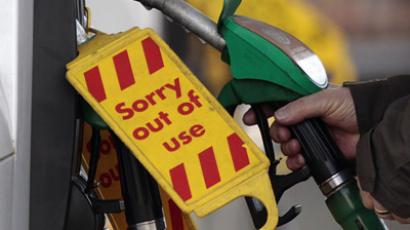Double dipping: Britain faces second round of recession
The UK’s economic forecast is cloudy with little chance of a speedy recovery, as the nation struggles to overcome its double-dip recession. Meanwhile, EU leaders are meeting to come up with a solution to the euro crisis – but seem to be striking out.
Britain’s shrinking economy has left shop owners and everyday workers worried about the country’s future.According to figures released by the UK Office for National Statistics (ONS), the British economy has been shrinking for three consecutive quarters. This is the second time this has happened in four years, putting it in “double-dip” territory for the first time since the 1970s.Britain has become one of just two G20 nations to face a double-dip recession. Italy is facing the same situation.The results are being felt throughout Britain.David Meers has owned and operated a London carpet store for 17 years, but the nation’s crippled economy has left him with no other choice than to let go of more than half his staff.“I really hate to lay anyone off. I really do. And I think anyone with a decent heart wouldn’t want to put someone out of work. But if we hadn’t have cut back, everyone would have gone, so I had to do it,” Meers told RT.But even those who have been fortunate enough to keep their jobs have found themselves no better off than they were 30 years ago. “The guys actually are working a lot harder for the same money that we were earning in 1980, and as we all know, things have increased a lot in price since then, plus tax and everything, so if it wasn’t for the support of our staff, I think we’d be in a lot of trouble,” Meers said.It has become a survival of the fittest scenario – and many who do manage to survive are barely scraping by. The outlook is anything but optimistic. In July, economists said to expect a long and arduous recovery. According to The Telegraph, Commerzbank economist Peter Dixon said of the ONS statistics, “Terrible data. Frankly there’s nothing good that comes out of these numbers at all… The economy looks to be badly holed below the water line at this stage. It’s a far worse period of activity than we’d expected.”And as shops sell fewer products and workers are faced with decreased job opportunities, citizens are becoming increasingly unhappy. “This is modern life – people are angry. We’ve seen people rioting in the streets recently because they’re frustrated,” Meers said.But the UK is not alone in facing fears of financial ruin and social unrest. EU member states are also struggling to keep afloat.
Meeting merry-go-round
Leaders from the European Union’s five largest economies are in a merry-go-round of meetings, as they focus their efforts on easing the EU’s troubled financial future. But it seems unlikely that a solution is around the corner.“They’ve been having meetings for years, but they continue to refuse to deal with the fundamental problems which are the imbalances between Europe, far too much debt, and slowing economic growth. And these issues are not all on the table,” financial adviser and wealth manager Marco Pietropoli told RT.Those who hope the meetings will lead to a miracle solution for the Eurozone shouldn’t hold their breath, according to sociologist Carlos Delclos. “If we’re talking about European society – regular people – I don’t think they have any reason to be optimistic. They haven’t had any reason to be optimistic for months now,” Delclos told RT. And as the leaders put their heads together to find a “cure-all pill” for the euro crisis, many believe a solution unlikely for countries like Greece. “Greece should have been allowed to leave the euro. They would have had a lot less debt and by now…it’s going to be difficult for the Greek government to impose a further two years of austerity on already high unemployment in Greece…and to impose further austerity may spark further social unrest,” Pietropoli said.Social unrest is a very real fear for Greece, which has been beset by protests since the first round of austerity measures were introduced in 2010.















